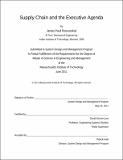| dc.contributor.advisor | David Simchi-Levi. | en_US |
| dc.contributor.author | Peruvankal, James Paul | en_US |
| dc.contributor.other | System Design and Management Program. | en_US |
| dc.date.accessioned | 2012-05-15T21:16:10Z | |
| dc.date.available | 2012-05-15T21:16:10Z | |
| dc.date.copyright | 2011 | en_US |
| dc.date.issued | 2011 | en_US |
| dc.identifier.uri | http://hdl.handle.net/1721.1/70833 | |
| dc.description | Thesis (S.M. in System Design and Management)--Massachusetts Institute of Technology, Engineering Systems Division, 2011. | en_US |
| dc.description | "June 2011." Cataloged from PDF version of thesis. | en_US |
| dc.description | Includes bibliographical references. | en_US |
| dc.description.abstract | In recent years, supply chain pundits and consultants emphasized the importance of strategies such as just-in-time, lean manufacturing, off- shoring or frequent deliveries to retail outlets. However, with significant economic changes, rising labor costs in developing countries, huge volatility in oil and other commodity prices, and new regulations such as carbon emission caps, some of these strategies may imperil the supply chain. At the same time, logistics and supply chain management have been the focus of executive meetings, business columns and research institutes as never before. The importance of integrated, globally optimized supply chains is well understood and it seems that in many companies executives have discovered the impact on business performance that can be achieved by effectively managing their supply chains. With all these changes and pressure, it will be quite remarkable if supply chain is not an important topic in the agenda of today's CEOs and CFOs. This study tries to answer questions such as - Is Supply Chain Management an important topic on the agenda of today's business leaders, in particular CEOs and CFOs? If it is on the agenda, what specifically is included? - risk management, cost cutting or new channels? If SCM is not directly on the CEOs/CFOs agenda, what is on their agenda? Is there a link between SCM and these topics? To gain insight into these issues, the research team collected data from about 200 companies across a variety of industries. Our results indicate not only a link between the executive agenda and supply chain strategies but also that business and financial performance go hand in hand with supply chain performance. The research results indicate significant difference between Cost-Efficient and Responsive supply chain strategies and an overall increasing drive towards flexibility. The research identifies the key supply chain strategies that could give the optimal results from operational, business and financial perspectives. | en_US |
| dc.description.statementofresponsibility | by James Paul Peruvankal. | en_US |
| dc.format.extent | [124] p. | en_US |
| dc.language.iso | eng | en_US |
| dc.publisher | Massachusetts Institute of Technology | en_US |
| dc.rights | M.I.T. theses are protected by
copyright. They may be viewed from this source for any purpose, but
reproduction or distribution in any format is prohibited without written
permission. See provided URL for inquiries about permission. | en_US |
| dc.rights.uri | http://dspace.mit.edu/handle/1721.1/7582 | en_US |
| dc.subject | Engineering Systems Division. | en_US |
| dc.subject | System Design and Management Program. | en_US |
| dc.title | Supply chain and the executive agenda | en_US |
| dc.title.alternative | Supply chain management and the executive agenda | en_US |
| dc.type | Thesis | en_US |
| dc.description.degree | S.M.in System Design and Management | en_US |
| dc.contributor.department | System Design and Management Program. | en_US |
| dc.contributor.department | Massachusetts Institute of Technology. Engineering Systems Division | |
| dc.identifier.oclc | 793202716 | en_US |
